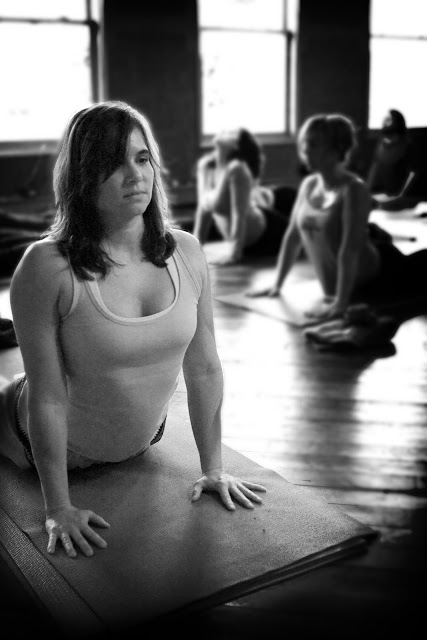At the tender age of 23, I chose yoga instruction as a career path.
Fast-forward seven years later and I have the best job in the world.
I get to wear yoga pants exclusively.
People are always happy to see me and feel even better when they leave me.
I get to contemplate things like truth, love and god, I get to move my body creatively and rest deeply on the clock.
Sounds pretty amazing, right?
I can also get stuck playing the role of therapist if I’m not careful. What I expect to be a brief hello before class often escalates into a life story. And the after class vibe sometimes feels like a waiting room—a line of open students that are ready to bare their souls.
It makes sense. I aim to facilitate physical, exploratory, vulnerable experiences on the mat.
Students feel a special connection to their teacher. An effective yoga practice is intensely personal and an inspirational teacher is usually intertwined into the students’ experience. The student-teacher dynamic is a truly beautiful thing in every tradition.
To keep that relationship pure, teachers must walk a fine line. Having the ability to set clear boundaries (and still be compassionate!) is a really important part of my job.
I find that I have to set boundaries on a case-by-case basis.
About 5 years ago, I had an experience that shook me. I was subbing a class and afterwards, a student came up to me and told me that her husband, who was in perfect health, had suddenly dropped dead from a heart attack. I stayed and talked with that student for an entire hour after the class was finished.
When I got home, I collapsed on my couch and cried for another hour. I felt so sad for this woman and held on to so much of her energy that it was affecting my ability to go about the rest of my day.
Often, I would be too tired to do my own practice from so much teaching, which I realize is a big red flag. (I warn my trainees about this all the time!)
Sometimes at the end of a long day of teaching, I would drink, smoke or over-eat out of pure emotional exhaustion. I was developing unhealthy coping habits to deal with the fact that I was a sensitive and co-dependent teacher.
I realized that if I was going to make a career out of yoga, I needed to set better boundaries.
Setting boundaries started with washing my hands immediately after class, symbolically rinsing away other people’s residual energy.
I got better at reading the many moods of my students and developed tools for keeping my emotional distance, while maintaining a physically welcoming presence.
I made time for my own practice again, which made a huge difference in my overall attitude.
When my mom was diagnosed with an aggressive brain cancer, setting boundaries with my students suddenly became effortless. I was less tolerant of hearing other peoples’ problems, as I was going through such a massive loss of my own, that I instantly changed my priorities.
I got into the habit of arriving just in time to teach my class (to avoid hearing any stories prior to teaching) and sometimes I would leave immediately after class before anyone had a chance to talk to me.
All I could do was teach, and I think my students understood that.
I do think it’s important to get to know your students and to genuinely check-in with them on a regular basis.
It’s also important to know yourself well enough to know if you are in an emotionally stable place to lend an ear. For a while, I knew that I wasn’t.
It’s been a little over year since my mom died, and over the past few months I’ve been making an effort to stay longer after class to socialize. At the beginning of a heavy conversation with a student, often related to loss, health issues, or just some general word vomiting of various concerns (which happens a lot and I totally understand!), I usually set a limit in my mind of how long I will listen.
There are also those students who are talkers by nature and notoriously corner teachers after every class. In that case, I generally wrap things up pretty quickly. I’ve even tactfully recommended my therapist.
In the past, the idea of setting boundaries made me feel guilty. I was afraid that my students would think I was heartless and uncaring of their current plight.
Over time, I realized that I serve everyone better by honoring my boundaries.
I can’t take away other peoples pain and I definitely can’t fix their problems. What I can do is actively listen for a reasonable amount of time, genuinely connect with the soul I am sharing space with, and let them know that they are not alone in their struggles.
Most of all, I serve by teaching an effective yoga class, which is my highest calling and what I love to do most.
Just like in the physical yoga practice, we must go through a sensation, not around it, if we expect to open a tight muscle, surrender tension, or grow stronger.
It’s the same idea with boundaries—the only way to determine if a new boundary is necessary is to test it. I am beyond grateful for every student that has tested my boundaries because they’ve helped me grow into the teacher I am today.
Love elephant and want to go steady?
Sign up for our (curated) daily and weekly newsletters!
Apprentice Editor: Emily Bartran / Editor: Renée Picard
Photo: Pixoto







Read 8 comments and reply